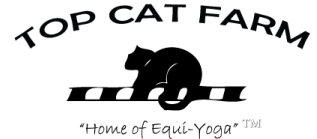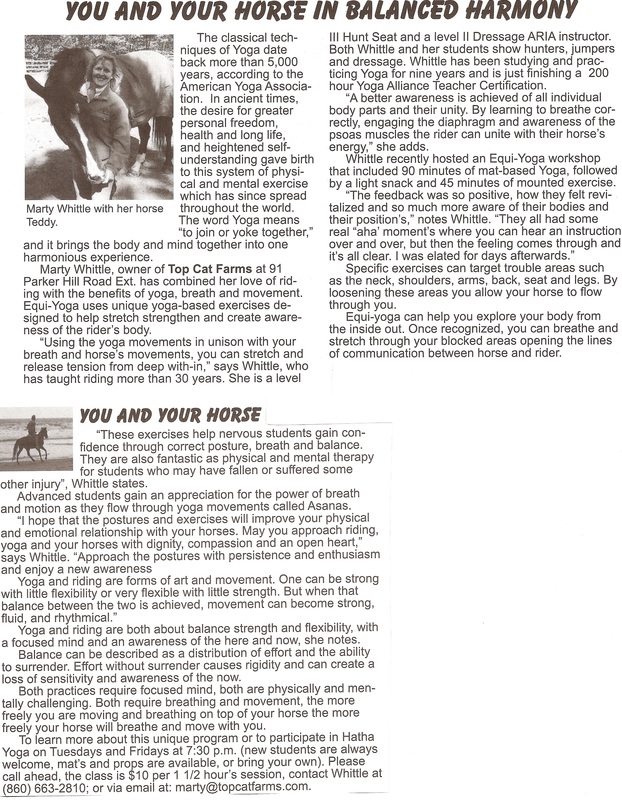Article from the Killingworth Krier
Article from Equitrekking
Learn How Equi-Yoga™ Benefits Equestrians
and Equines
February 13, 2012
Find out the many benefits of practicing Equi-Yoga™ as a rider, and how it can help your equine partner.
by Raina Paucar
I have known Marty Whittle since I was a child. She is the instructor who shaped me into the rider I am today. Had it not been for her, I may never have acquired the riding skills or confidence needed to pursue a career as a jockey. When I first heard about Equi-Yoga™, yoga-based exercises on horseback, I was interested in what it was and how it could improve my skill-set as a rider. I discovered what was missing from my daily routine before riding. These exercises have given me a renewed sense of presense and awareness, not only in the saddle, but outside of the barn, too.
Marty Whittle is a riding instructor, published author and owner of TopCat Farm. She shares how the creation of Equi-Yoga™ came about, and how it has helped her improve her riding technique. She is also working on an Equi-Yoga™ video with additional exercises that can be done "on the go" for the traveling equestrian. She is also creating certification classes, for those who want to teach Equi-Yoga™.
“Equi-Yoga™ has been a gift to me and I feel very blessed to be able to help others.” -Marty Whittle, creator of Equi-Yoga™
Equitrekking: Can you share with us your story on how you became involved in horses?
Marty Whittle: Horses came into my life through books, stuffed toys and Breyer model horses. During the pony rides at Rye Playland, I met a pony for the first time. After that, I was hooked on horses. There is a clarity that comes with being a child. I knew that in order for me to live my life fully, these magnificent and generous creatures must be in my life.
Equitrekking: What inspired you to develop Equi-Yoga™?
Marty Whittle: Equi-Yoga™ developed from my exploration into the practice of yoga. My first yoga class humbled me tremendously. I realized I could not balance on one leg, not for any length-of-time. Here I was thinking I was a well-balanced rider, but I could not even balance myself.
Equitrekking: Can you share with us a personal experience about how Equi-Yoga™ has benefited you?
Marty Whittle: As my yoga practice improved, my riding did as well. My jumper was no longer jumping me out of the tack over bigger fences. I could stay with him in the air by folding, as in Utktasana-chair pose. Now, I am able to help young horses that are green and uncoordinated, because I have awareness and more strength in my core and legs.
As an instructor, I am always looking for ways to make it easier for my students to feel their horses. For horse and rider to become one, we must allow our communication to be clear and subtle. Most of us are not in tune with our bodies from the neck down, and our breathing patterns have become almost reptilian.
Once I realized how much practicing yoga helped me, it was instinctive to bring the mat to the mount. All the wonderful tools I was learning on my mat–– correct breathing, calm mind and loving the moment we are in now–– are essential for a good rider.
Marty balancing over poles ©Penny Barsch
Equitrekking: What is the difference between yoga and Equi-Yoga™?
Marty Whittle: Equi-Yoga™ is yoga combined with the beautiful, healing qualities that horses bring into our lives. All horses respond to a riders’ breathing and stretching in a positive manner. By breathing deeply and relaxing, they feel their riders melt into them.
Equitrekking: Can Equi-Yoga™ be practiced by any rider?
Marty Whittle: Equi-Yoga™ can been practiced by any style of rider, at any level. I have taught complete beginners of riding and yoga with great-success. All the poses can be modified to accommodate different body types and strengths. The exercises are constantly evolving and growing as my practice expands.
*Please note: exercises shown below should initially be practiced with a certified Equi-Yoga™ instructor.
We can bring awareness, stillness and mindfulness with attention to our breath during chores. By doing this, we will help make the chores become more meditative, peaceful and safe.
I encourage people to take 5 to 15 minutes to warm-up, stretch, breath deeply and check inside by tuning into their bodies, as they are at present moment, before they pick up the reins or a pitchfork.
and Equines
February 13, 2012
Find out the many benefits of practicing Equi-Yoga™ as a rider, and how it can help your equine partner.
by Raina Paucar
I have known Marty Whittle since I was a child. She is the instructor who shaped me into the rider I am today. Had it not been for her, I may never have acquired the riding skills or confidence needed to pursue a career as a jockey. When I first heard about Equi-Yoga™, yoga-based exercises on horseback, I was interested in what it was and how it could improve my skill-set as a rider. I discovered what was missing from my daily routine before riding. These exercises have given me a renewed sense of presense and awareness, not only in the saddle, but outside of the barn, too.
Marty Whittle is a riding instructor, published author and owner of TopCat Farm. She shares how the creation of Equi-Yoga™ came about, and how it has helped her improve her riding technique. She is also working on an Equi-Yoga™ video with additional exercises that can be done "on the go" for the traveling equestrian. She is also creating certification classes, for those who want to teach Equi-Yoga™.
“Equi-Yoga™ has been a gift to me and I feel very blessed to be able to help others.” -Marty Whittle, creator of Equi-Yoga™
Equitrekking: Can you share with us your story on how you became involved in horses?
Marty Whittle: Horses came into my life through books, stuffed toys and Breyer model horses. During the pony rides at Rye Playland, I met a pony for the first time. After that, I was hooked on horses. There is a clarity that comes with being a child. I knew that in order for me to live my life fully, these magnificent and generous creatures must be in my life.
Equitrekking: What inspired you to develop Equi-Yoga™?
Marty Whittle: Equi-Yoga™ developed from my exploration into the practice of yoga. My first yoga class humbled me tremendously. I realized I could not balance on one leg, not for any length-of-time. Here I was thinking I was a well-balanced rider, but I could not even balance myself.
Equitrekking: Can you share with us a personal experience about how Equi-Yoga™ has benefited you?
Marty Whittle: As my yoga practice improved, my riding did as well. My jumper was no longer jumping me out of the tack over bigger fences. I could stay with him in the air by folding, as in Utktasana-chair pose. Now, I am able to help young horses that are green and uncoordinated, because I have awareness and more strength in my core and legs.
As an instructor, I am always looking for ways to make it easier for my students to feel their horses. For horse and rider to become one, we must allow our communication to be clear and subtle. Most of us are not in tune with our bodies from the neck down, and our breathing patterns have become almost reptilian.
Once I realized how much practicing yoga helped me, it was instinctive to bring the mat to the mount. All the wonderful tools I was learning on my mat–– correct breathing, calm mind and loving the moment we are in now–– are essential for a good rider.
Marty balancing over poles ©Penny Barsch
Equitrekking: What is the difference between yoga and Equi-Yoga™?
Marty Whittle: Equi-Yoga™ is yoga combined with the beautiful, healing qualities that horses bring into our lives. All horses respond to a riders’ breathing and stretching in a positive manner. By breathing deeply and relaxing, they feel their riders melt into them.
Equitrekking: Can Equi-Yoga™ be practiced by any rider?
Marty Whittle: Equi-Yoga™ can been practiced by any style of rider, at any level. I have taught complete beginners of riding and yoga with great-success. All the poses can be modified to accommodate different body types and strengths. The exercises are constantly evolving and growing as my practice expands.
*Please note: exercises shown below should initially be practiced with a certified Equi-Yoga™ instructor.
We can bring awareness, stillness and mindfulness with attention to our breath during chores. By doing this, we will help make the chores become more meditative, peaceful and safe.
I encourage people to take 5 to 15 minutes to warm-up, stretch, breath deeply and check inside by tuning into their bodies, as they are at present moment, before they pick up the reins or a pitchfork.
Tri-Town Summer Camp from Zip06


